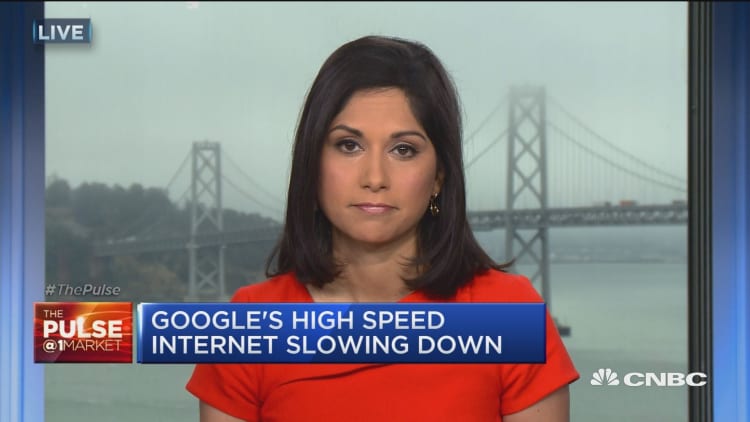Google Fiber, Alphabet's bold plan to create a competitor to the telecom industry establishment's high-speed internet and TV service, is slowing down.
According to a report in the Wall Street Journal, Google's speedy Fiber has run into reality: Telecom business costs are steep and require a rethink. Costs include digging up backyards and streets to lay cables, and dealing with an old guard in the telecom business that owns utility poles and isn't always inclined to play along. The time and expense involved are now forcing the tech giant to consider an alternative road map for providing broadband access to homes and businesses across the United States.
Jonathan Reichental, chief technology officer of the city of Palo Alto, California, was quoted by the WSJ saying Google Fiber executives recently told him plans to bring the service to Palo Alto and nearby cities are on hold for at least six months.
"We're continuing to work with city leaders to explore the possibility of bringing Google Fiber to many cities. This means deploying the latest technologies in alignment with our product road map, while understanding local considerations and challenges, which takes time," Alphabet said in a statement to the WSJ.

There are currently six U.S. cities with Fiber: Provo, Utah; Kansas City (Missouri and Kansas); Austin, Texas; Huntsville, Alabama; Atlanta; and Charlotte, North Carolina.Fiber has plans to expand to as many as 16 new cities. Fiber offers residential service but has also been a key selling point for cities to attract small business and for real estate property managers.
A Fiber plan that includes high-speed internet (estimated at 30 times faster than the industry average) and TV costs $130 in cities such as Kansas City — $70 for internet alone and $60 for TV service.
In June, Google Fiber bought Webpass, a 13-year-old internet service provider focusing on businesses and residential connections. Like Google Fiber, Webpass offers speeds of up to 1 gigabyte per second.
In an interview with Recode earlier this year, Craig Barratt, CEO of the Access unit that oversees Fiber, said the company is working on connecting wireless towers to existing fiber lines and is "experimenting with a number of different wireless technologies" to make that happen. It was the first time Barratt or anyone at Alphabet had publicly talked about their interest in wireless.
"We are experimenting with a number of different wireless technologies. One of the things that is intriguing about wireless is that it allows you to reach houses and users that are in lower-density settings — where fiber becomes too expensive. So providing fixed wireless services using some of the technologies we think are ways of accelerating our deployments," Barratt told Recode.
The WSJ estimated Google has spent hundreds of millions of dollars to dig up ground and lay cable for Fiber operations. In its most recent earnings, the "Other Bets" Google unit that includes Fiber reported revenue of $185 million but an operating loss of $859 million. Fiber is one of only three bets in this category to earn money, alongside smart thermostat-maker Nest and its life-sciences unit Verily.
Barratt told Recode that Fiber is not fixated on a single technology approach to broadband service: "We think, over time, there will be a sort of heterogeneous mix of technologies that we can use, depending upon the type of problem we're trying to solve."





